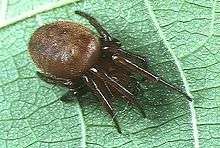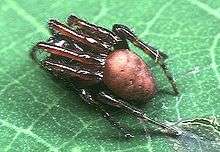Acusilas coccineus
Acusilas coccineus is a species of spider in the family Araneidae, found from India and China to Indonesia (the Moluccas).[1] In India particularly, it has been known by the synonym Phonognatha vicitra Sherriffs, 1928, but this is based on a misidentification.[2][3] In India, it is found in woodlands and among shrubs. It is a small orb-weaver.
| Acusilas coccineus | |
|---|---|
 | |
| Female | |
 | |
| Male | |
| Scientific classification | |
| Kingdom: | Animalia |
| Phylum: | Arthropoda |
| Subphylum: | Chelicerata |
| Class: | Arachnida |
| Order: | Araneae |
| Infraorder: | Araneomorphae |
| Family: | Araneidae |
| Genus: | Acusilas |
| Species: | A. coccineus |
| Binomial name | |
| Acusilas coccineus | |
| Synonyms[1] | |
| |
The spider is distinguished by having a curled leaf at the center of its web, in which it shelters. The curled leaf also shelters eggs.
Appearance
The body length varies from 5mm up to 10mm.[4] Their bodies are fat and oval shaped with long tapered legs.
Web
The web, with its shelter at the center is easily identifiable. The leaf curling spider cleverly weaves a leaf or another object into the center of its web as a hide-away from predators. Leaves are twisted along the length to form a funnel. It is an incomplete circle, being open at the top and fanning downwards. The spider uses supporting threads attached to a shrub to suspend its curled-up dry leaf, with the fan-like main web radiating out from the leaf in which the spider hides, with only the tips of its legs visible, feeling for the vibrations of insects colliding with the web. It only leaves its shelter if the prey is stuck in the web, or if the web needs repair. Like other orb weavers, the spider usually rebuilds its web at night.
Distribution
Acusilas coccineus is found from India and China to Indonesia (the Moluccas).[1] Only a few observation in India are known to exist since W.R. Sherriffs in 1928.[5][6] The spider is commonly found in open woodland and forest habitats.
Behavior
Its fangs are small and the spider is timid. Toxicity to humans in unknown. The leaf curling spiders are day-active orb weavers, protecting themselves from predators by hiding inside the shelter. Such leaves may already be partly curled though many are not, and the spider pulls and silks its leaf into a retreat cylinder, silken shut at the top and open at the hub.
References
- "Taxon details Acusilas coccineus Simon, 1895". World Spider Catalog. Natural History Museum Bern. Retrieved 2018-09-19.
- Sankaran, P.M. & Sebastian, P.A. (2018). "Phonognatha vicitra Sherriffs, 1928—a taxonomic misidentification of the orb-weaving spider Acusilas coccineus Simon, 1895 (Araneae, Araneidae)". Zootaxa. 4434 (2): 391–395. doi:10.11646/zootaxa.4434.2.12.
- "Catalogue of Life : Phonognatha vicitra Sherriffs, 1928". www.catalogueoflife.org.
- Keswani, S.; P. Hadole and A. Rajoria "CHECKLIST OF SPIDERS (ARACHNIDA: ARANEAE)FROM INDIA-2012"
- "Phonognatha vicitra". iNaturalist.org.
- Sherriffs, W. R. (1928). South Indian Arachnology. Part III. Annals and Magazine of Natural History (10) 2: 177-192.